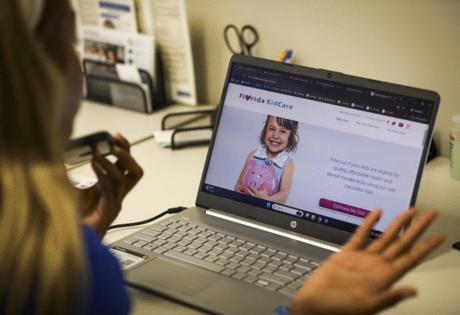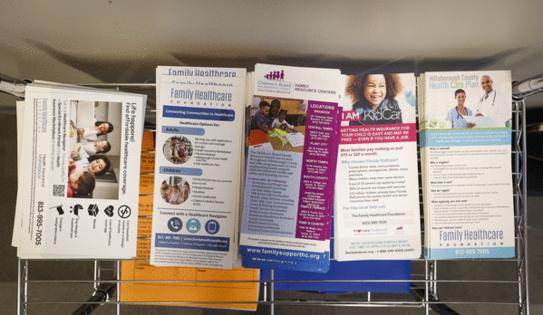Uncertainty about Obamacare's future under Trump is felt acutely in Florida
Published in Health & Fitness
More than 12 million Americans got their health insurance through the Affordable Care Act in 2017 when a Republican bill to scrap the program fell two U.S. Senate votes short.
With more than 21.4 million Americans now insured through federal marketplace plans, the future of the program is again in doubt with the return of Donald Trump to the White House and a GOP majority likely in both the U.S. House and Senate.
Expanded federal subsidies put in place during the pandemic to make insurance premiums more affordable — and in some cases free — for millions of lower-income Americans expire at the end of 2025. If not extended by the new Congress, an estimated 4 million people could lose health insurance in 2026, the nonpartisan Congressional Budget Office estimates.
Also at risk is a rule change adopted in May that opened the Affordable Care Act in 2025 to undocumented immigrants who arrived in the United States as children but have been eligible for benefits like schooling since the creation in 2012 of the Deferred Action for Childhood Arrivals program.
Significant changes to the program would have a big impact in Florida, where 4.2 million residents are enrolled this year — the most in the nation. With the 2025 enrollment period already underway, program administrators are fielding questions from Floridians fearful that their insurance will be canceled, said Xonjenese Jacobs, director of Florida Covering Kids & Families, a nonprofit based at the University of South Florida that coordinates enrollment across the state.
For now, the response is it’s business as usual.
“We’re continuing to enroll consumers and educate them and assist them despite what they deem to be some uncertainty,” Jacobs said.
Since it took effect in 2014, the Affordable Care Act — often called “Obamacare” — has made health insurance affordable to more Americans by creating health insurance marketplaces and subsidizing the cost of premiums. The legislation also provided protections for preexisting health conditions and let parents keep children on their health plans until they turn 26. Widely regarded as the signature policy of President Barack Obama, the program is disliked by Republicans who label it as bureaucratic, expensive and lacking in choice.
In addition to the failed vote to scrap the program, the Trump administration in 2017 reduced the sign-up window for consumers to six weeks, slashed the program’s marketing budget by $90 million and cut $25 million from the funding for navigators — trained workers who help people pick and enroll in insurance plans.
Trump rarely talked about health care in this year’s campaign. When asked by ABC moderators during the September presidential debate if he had a plan for something to replace the program, he said that he has “the concepts of a plan.”
Florida Covering Kids & Families will receive $13.7 million for outreach, education and enrollment support this year, the largest grant in the nation. It provides navigators in all 67 Florida counties during the two-month enrollment window, with services offered in more than 100 languages, said Jacobs.
The popularity of the program has helped to lower Florida’s uninsured rate to about 10% in 2023, according to data from KFF, the health policy nonprofit formerly known as the Kaiser Family Foundation.
Among those already enrolled for next year are a number of immigrants who qualify through the new federal provision, especially in South Florida, said Jacobs. Previously, those in the Deferred Action for Childhood Arrivals program — often referred to as “Dreamers” — were not considered “legally present.” That meant that they didn’t qualify for federally funded health care programs like Medicaid and the Affordable Care Act marketplace plans.
“It’s so essential and important these ‘Dreamers’ have the opportunity to get coverage,” Jacobs said.
Health insurance is subsidized for the majority of those who sign up for marketplace plans. Without that, premiums could increase by several hundred dollars a month, said Katie Roders Turner, executive director of the Family Healthcare Foundation, a nonprofit that runs enrollment in the Tampa Bay region.
The program is popular with people who are self-employed and those who don’t get insurance through their work, Roders Turner said. It’s also benefitted those who retire early and need health insurance until they turn 65 and qualify for Medicare.
“Without subsidies, we may see our uninsured numbers increase,” she said.
Valrico retiree Dawn McAlpin is among those hoping to stay insured through a federal marketplace plan until she turns 65.
Now 63, she has no cartilage in her knees and needs ongoing physical therapy. Her marketplace health plan pays for up to 35 sessions per year. A retired assistant schoolteacher, she pays no monthly premium.
“I couldn’t afford the insurance and pay for X-rays and MRIs,” she said.
St. Petersburg resident Melanie Korpi, who runs her own business advising companies on online education, has been enrolled for several years.
She learned while signing up for 2025 that it could be the last year for subsidies.
“It’s concerning,” she said. “I wouldn’t be able to afford health insurance for myself otherwise.”
___________
2025 Affordable Care Act Enrollment
Enrollment in the 2025 Affordable Care Act federal marketplace runs through Jan. 15. To be eligible for coverage beginning Jan. 1, residents must enroll by Dec. 15.
For help with enrollment in Tampa Bay go to www.familyhealthcarefdn.org or call 813-995-7005.
For other parts of Florida, log onto www.coveringflorida.org or call 877-813-9115.
_________
©2024 Tampa Bay Times. Visit tampabay.com. Distributed by Tribune Content Agency, LLC.















Comments